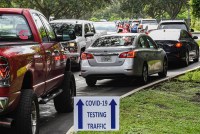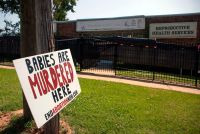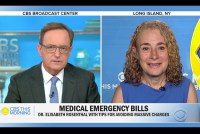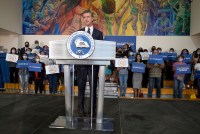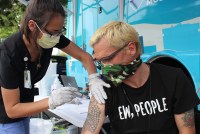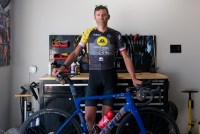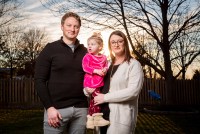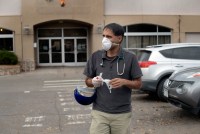Latest Morning Briefing Stories
Déjà Vu? Consumers Scramble for Covid Tests in Hard-Hit Areas
As the nation confronts the delta variant, many consumers are again facing delays getting tested. The problem appears most acute in the South and Midwest, where new infections are growing the fastest.
Hard Lessons From a City That Tried to Privatize Public Health
Facing bankruptcy, Detroit largely dismantled its public health department in 2012, and the city essentially went two years without a government-run public health system. Five years later, this major American city offers a grim cautionary tale.
Pharmacies Face Extra Audit Burdens That Threaten Their Existence
Pharmacy benefit managers have curtailed in-person audits of pharmacy claims during the pandemic, switching to virtual audits done by computer. That has markedly increased the number of claims they can review — and the chances for payment denials — squeezing pharmacies and bringing in more cash for the benefit companies.
KHN’s ‘What the Health?’: Delta Blues
Covid is back with a vengeance, with some people clamoring for booster shots while others harden their resistance to getting vaccinated at all. Meanwhile, the Food and Drug Administration is pushing hard on drugmaker Pfizer’s request to upgrade the emergency authorization for its vaccine and give it final approval. Alice Miranda Ollstein of Politico, Rachel Cohrs of Stat and Sarah Karlin-Smith of the Pink Sheet join KHN’s Julie Rovner to discuss these issues and more. Also, for “extra credit,” the panelists suggest their favorite health policy stories of the week they think you should read, too.
Feds to Nix Work Requirements in Montana Medicaid Expansion Program
State health officials say the federal government will likely reject any work or community engagement requirements, which were key to Republican lawmakers agreeing to extend the program that insures 100,000 low-income Montana adults.
New Moms Latched On to Remote Breastfeeding Help. Will Demand Wane as Pandemic Fades?
The pandemic forced new parents to find help with breastfeeding online. Now, some offerings are remaining virtual to help expand access to lactation support.
Long Drives, Air Travel, Exhausting Waits: What Abortion Requires in the South
Restrictive abortion regulations enacted across the South require women to drive across state lines to find safe services. With the U.S. Supreme Court set to hear a challenge to Roe v. Wade, abortion rights defenders say long drives and wait times could become the norm across much of America.
Why is the South the Epicenter of Anti-Abortion Fervor?
The Supreme Court, come autumn, will consider a Mississippi law that bans nearly all abortions after 15 weeks of pregnancy. That’s hardly the most restrictive abortion law passed in the South. How did anti-abortion views become concentrated in the South?
A Health Care Giant Sold Off Dozens of Hospitals — But Continued Suing Patients
Community Health Systems, a large, for profit hospital chain, shrank from more than 200 to 84 facilities. It is continuing to sue patients for hospitals that now exist as little more than legal entities.
12,000 Square Miles Without Obstetrics? It’s a Possibility in West Texas
Big Bend Regional Medical Center, the only hospital in a sparsely populated region of West Texas, announced that because of a nursing shortage its labor and delivery unit must close for days at a time and patients must go instead to a hospital an hour away.
Watch: Cyclist Hits Olympic-Size Medical Bills After Crash
KHN Editor-in-Chief Elisabeth Rosenthal appears on “CBS This Morning” to discuss the latest installment of the KHN-NPR Bill of the Month investigative series.
Facing Recall, Newsom Draws Support From Health Care Allies
California Gov. Gavin Newsom faces a recall election in September, fueled in part by anger over his pandemic policies. The health care industry has ponied up more than $4.8 million so far to defend the first-term Democrat.
Bus Stop by Bus Stop, Denver-Area Officials Microtarget Vaccine Hesitancy
Using detailed maps that show vaccination rates down to the ZIP code or census tract level, health departments highlight areas of greater Denver where vaccinations lag behind state or county averages, then partner with community organizations to overcome barriers. Can this be a model for President Joe Biden’s “neighborhood by neighborhood” approach?
Amid Covid Booster Debate, West Virginia to Check Immunity of Vaccinated Nursing Home Residents
The state says it will look at the levels of disease-fighting antibodies among nursing home residents vaccinated against covid, which could help indicate whether they need a booster shot.
KHN’s ‘What the Health?’: Hot Covid Summer
The summer that promised to let Americans resume a relatively normal life is turning into another summer of anxiety and face masks, as the delta variant drives covid caseloads up in all 50 states. Meanwhile, the Americans with Disabilities Act turns 35, and the Missouri Supreme Court orders the state to expand Medicaid after all. Mary Ellen McIntire of CQ Roll Call, Anna Edney of Bloomberg News and Rachana Pradhan of KHN join KHN’s Julie Rovner to discuss these issues and more. Also, Rovner interviews KHN’s Samantha Young, who reported and wrote the latest KHN-NPR “Bill of the Month” episode about an Olympic-level athlete with an Olympic-size medical bill.
Olympic Dream Dashed After Bike Crash and Nightmare Medical Bill Over $200K
A bicyclist from California competed in a Pennsylvania race that could have landed him in this month’s Tokyo Olympics. Instead, a crash on the velodrome track landed him in two hospitals where his out-of-state, out-of-network surgeries garnered huge bills.
Covid Renews Interest in Radiation, but Docs Caution Against Pilgrimages to Radon-Filled Mines
Each year, people in pain travel to Montana and pay to sit amid radon gas, which is pitched as therapy for a long list of health issues. While low-dose radiation therapy is getting another look amid the pandemic, experts say that treatment is different than sitting in a tunnel of radioactive gas.
Bye-Bye to Health Insurance ‘Birthday Rule’? Kansas Lawmaker Floats Fix
U.S. Rep. Sharice Davids (D-Kansas) introduced a bill to do away with a health insurance rule that dictates which parent’s plan becomes a new baby’s primary insurer. This could save some parents from unexpected, sometimes massive medical bills. Davids took up the issue after a KHN/NPR Bill of the Month story on one family’s unexpected $207,455 NICU bill.
How a Doctor Breaks Norms to Treat Refugees and Recent Immigrants
In a suburb of Denver, a doctor runs a clinic that finds creative solutions to treat a large refugee and immigrant population, sometimes to the dismay of the medical establishment.
The Pandemic Made Telemedicine an Instant Hit. Patients and Providers Feel the Growing Pains.
Patients seem to like remote visits, and health care providers now depend on them. But outages, freezing and other glitches cost time and money, and compromise quality of care.



